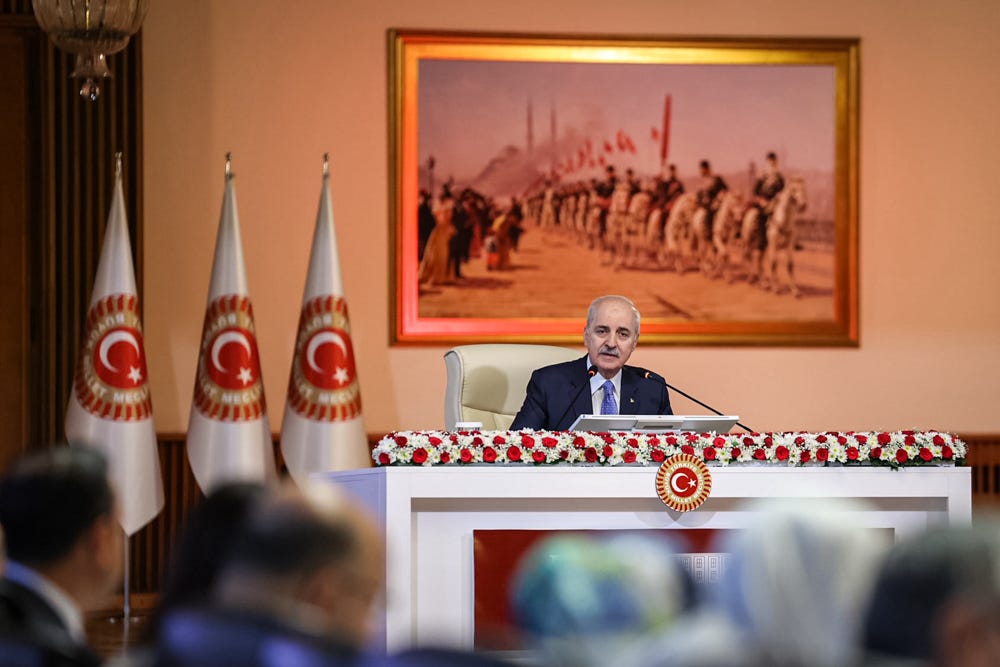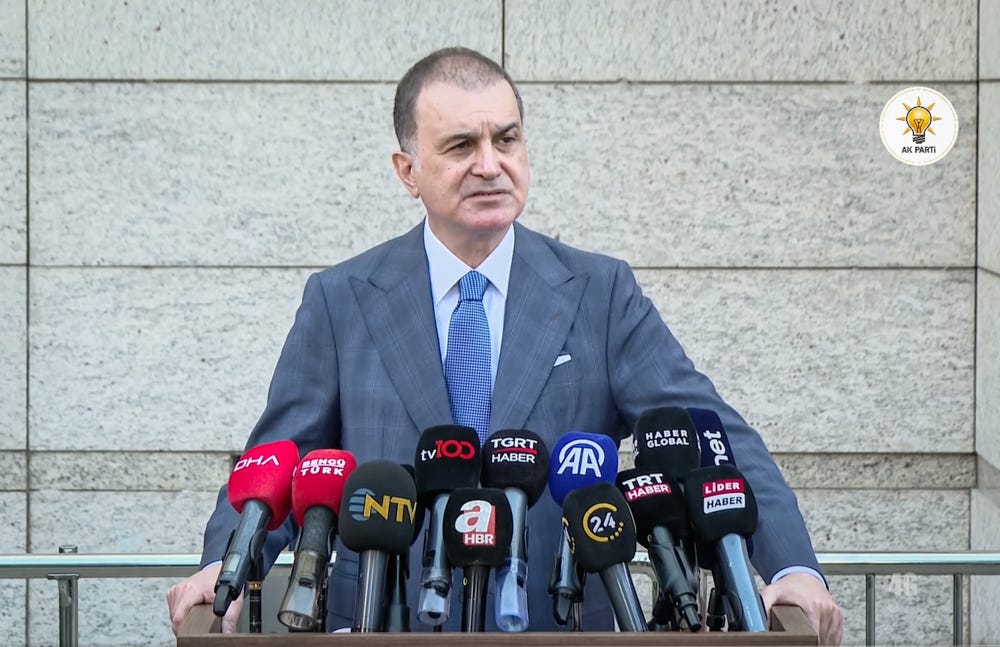Nothing says summer like a mangal in front of a “mangals are prohibited” sign. That said, we’re going on summer break!
Dear readers: We’re taking the next two weeks off to hike and recharge. Recaps will be paused, but we’ve got some good stuff lined up so your inbox doesn’t feel ghosted.
And of course, if big news breaks, we’ll be back to recap it. Cheers!
In this week’s recap:
Commission formed to oversee peace process
Fake diploma scandal riles Turkey
Domestic and diplomatic wraps
AI cannot choose watermelons, vendors say
Also from us this week:
Mohammed A. Salih outlines how events in Syria impact the peace process on our podcast
Nimet Kıraç reports on how Turkey’s wildfire response falls short and costs lives
Tomorrow: Emily Rice Johnson gauges the latest inflation stats in Economy recap

“National solidarity, brotherhood and democracy” may not be the first concepts that come to mind when contemplating Turkish politics – but a parliamentary commission was established to address just that.
Bearing the same name, the commission is tasked with identifying and preparing legal regulations to advance the Turkey-PKK peace process after the weapons burning ceremony last month.
It’s a concrete step in a massive undertaking that could reshape not just Turkey, but also Pres. Erdoğan’s legacy and/or tenure – and lawmakers have a Dec. 31 deadline to sort it out with a two-month extension, if needed. (Good luck!)
As commission members held the inaugural meeting Tuesday, setting its scope and procedures, the peace process remained highly fragile amid regional instability and highly controversial after more than 40 years of conflict that has polarized much of the society.
It's an emotional issue that can be argued both ways. The pro-Kurdish DEM Party* can point to the lack of language rights and ongoing lockdowns known as “temporary special security zones” in the southeast.
While nationalist IYI Party Chair Müsavat Dervişoğlu can point to foreign think tank columns that frame Turkey’s partition as “inevitable” to support his statements about the commission on Sözcü TV Wednesday.
"This is an imposition of the Treaty of Sèvres. This is the implementation of imperialism's century-old dream in the name of the Greater Middle East Project. It is a conspiracy designed to weaken the unitary state structure in Turkey and destroy the very definition of citizenship,” said Dervişoğlu, a leading voice against the peace process.
The commission’s job is to overcome these divisions and Parliament Speaker Numan Kurtulmuş tried to do that in his opening comments Tuesday, stating “we will establish phrases of brotherhood and act together” while stressing the body would not draft a new constitution.
Erdogan’s critics have argued the peace process and the commission are attempts to prolong his tenure and implement his long-sought constitutional changes. MHP deputy chair Feti Yıldız also pushed back on the latter, stating: "The commission has no duty to draft a constitution. The first four articles are not open to discussion."
Still, every party has requests. Here they are for CHP and DEM. Speaking for the KCK – the umbrella organization of the PKK – Mustafa Karasu said the first thing commission members should do is meet PKK leader Abdullah Öcalan.
In the next commission meeting, on Friday, Aug. 8, they’ll instead meet Turkish intel chief İbrahim Kalın, Defense Min. Yaşar Güler and Interior Min. Ali Yerlikaya.
Members will also finalize a DEM proposal to fill three vacant commission seats allotted to IYI Party, which is not participating. The change would raise DEM’s seat count from 4 to 5, AKP’s from 21 to 22 and CHP’s from 10 to 11. There are 51 total seats.
Analysis: To get a sense of what this means, I exchanged texts with Ezgi Başaran, a journalist, political scientist and author of the book Frontline Turkey: The Conflict at the Heart of the Middle East, which chronicles the collapse of the last peace process.
She said the establishment of the commission is a “pivotal moment” that reflects the Kurdish movement’s demand to anchor the peace process in parliament. Başaran also noted CHP’s participation is “significant” as many of their supporters remain “deeply skeptical.”
“After all, how can a conflict that hinges on democratic reform and the recognition of Kurdish cultural rights be resolved under a government that is so hostile to democracy and freedom of expression,” she told Turkey recap in a written response.
Başaran added, “The reality is that conflict resolution, especially in its early phases, does not depend on democratic actors. It depends on decisive ones. For now, the Erdoğan and Bahçeli duo appears sufficient to carry this highly transactional process forward.”
She also warned both the peace process and the commission remain susceptible to disruption and unforeseen circumstances.
“The process rests entirely on Erdoğan’s whims. I would not be surprised if, at any moment, he decides it threatens his hold on power and shuts it down. He did that in 2015. But unlike then, he now needs this process, especially for his ambitious maneuvers in Syria,” Başaran said.
“At this stage, the commission’s formation signals movement. And credit must be given to CHP leader Özgür Özel. Even though he and his party are under constant attack by the government, he has recognized that resolving the Kurdish question goes beyond day-to-day politics and Erdoğan’s provocations. He continues to support the process. That matters.”
*Disclosure for new readers: My wife, Ceylan Akça, is a deputy with DEM Party

Forge all intents and purposes: Fake diploma scandal riles Turkey


